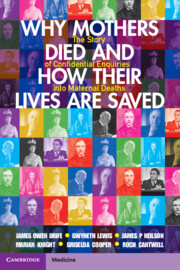 Why Mothers Died and How their Lives are Saved
Why Mothers Died and How their Lives are Saved Book contents
- Why Mothers Died and How Their Lives Are Saved
- Why Mothers Died and How Their Lives Are Saved
- Copyright page
- Contents
- Contributors
- Foreword
- Foreword
- Introduction
- 1 Historical Background
- 2 THE FIRST STEPS: 1900–1939
- 3 How the Confidential Enquiries Evolved
- 4 THE MISSING CHAPTER? PROLONGED LABOUR AND OBSTETRIC TRAUMA
- 5 HOW THE CHANGE BEGAN: THE STORY OF SEPSIS
- 6 Haemorrhage Then and Now
- 7 HYPERTENSION: ENQUIRIES, TRIALS AND RECOMMENDATIONS
- 8 The Story of Abortion
- 9 CHALLENGING TRADITION: THE STORY OF EMBOLISM
- 10 Pregnancy and Illness
- 11 Maternal Death due to Anaesthesia
- 12 Psychiatric Illness
- 13 THE MOTHERS WHO DIED: SOCIAL DETERMINANTS OF MATERNAL HEALTH
- 14 THE LEGACY IN THE UNITED KINGDOM: THE CONCEPT OF ‘NEAR MISS’ AND THE NEED TO KEEP SAVING LIVES
- 15 International Maternal Health: Global Action
- 16 International Action: Personal Views
- Figure Permissions
- Further Reading
- Index
14 - THE LEGACY IN THE UNITED KINGDOM: THE CONCEPT OF ‘NEAR MISS’ AND THE NEED TO KEEP SAVING LIVES
Published online by Cambridge University Press: 05 April 2023
- Why Mothers Died and How Their Lives Are Saved
- Why Mothers Died and How Their Lives Are Saved
- Copyright page
- Contents
- Contributors
- Foreword
- Foreword
- Introduction
- 1 Historical Background
- 2 THE FIRST STEPS: 1900–1939
- 3 How the Confidential Enquiries Evolved
- 4 THE MISSING CHAPTER? PROLONGED LABOUR AND OBSTETRIC TRAUMA
- 5 HOW THE CHANGE BEGAN: THE STORY OF SEPSIS
- 6 Haemorrhage Then and Now
- 7 HYPERTENSION: ENQUIRIES, TRIALS AND RECOMMENDATIONS
- 8 The Story of Abortion
- 9 CHALLENGING TRADITION: THE STORY OF EMBOLISM
- 10 Pregnancy and Illness
- 11 Maternal Death due to Anaesthesia
- 12 Psychiatric Illness
- 13 THE MOTHERS WHO DIED: SOCIAL DETERMINANTS OF MATERNAL HEALTH
- 14 THE LEGACY IN THE UNITED KINGDOM: THE CONCEPT OF ‘NEAR MISS’ AND THE NEED TO KEEP SAVING LIVES
- 15 International Maternal Health: Global Action
- 16 International Action: Personal Views
- Figure Permissions
- Further Reading
- Index
Summary
In 2012 the Enquiry moved to the National Perinatal Epidemiology Unit (NPEU) as part of MBRRACE-UK. CEMD Reports became annual and included near-misses. Life-threatening complications are 100 times commoner than death in pregnancy. In 2005 the NPEU had established a surveillance system through which all obstetric units notify uncommon complications. This facilitated a Confidential Enquiry into Maternal Morbidity, which identified an increase in severe haemorrhage due to abnormal placentation, and inadequate treatment of breast cancer due to withholding drugs in pregnancy. Positive trends included better long-term results of treating psychosis. The Enquiries’ work was hampered by NHS bureaucracy, the need for recommendations to be cost-neutral and a media embargo – even though the CEMD had shown that public information is vital for improving safety. Recently the CEMD revealed an increase in deaths from sudden death in epilepsy (SUDEP) due to withdrawal of medication in pregnancy, and continuing disparity in mortality rates between ethnic groups in the UK. Structural biases in the maternity care system persist, as shown by Black Lives Matter movement and the COVID emergency.
Keywords
- Type
- Chapter
- Information
- Why Mothers Died and How their Lives are SavedThe Story of Confidential Enquiries into Maternal Deaths, pp. 180 - 192Publisher: Cambridge University PressPrint publication year: 2023
